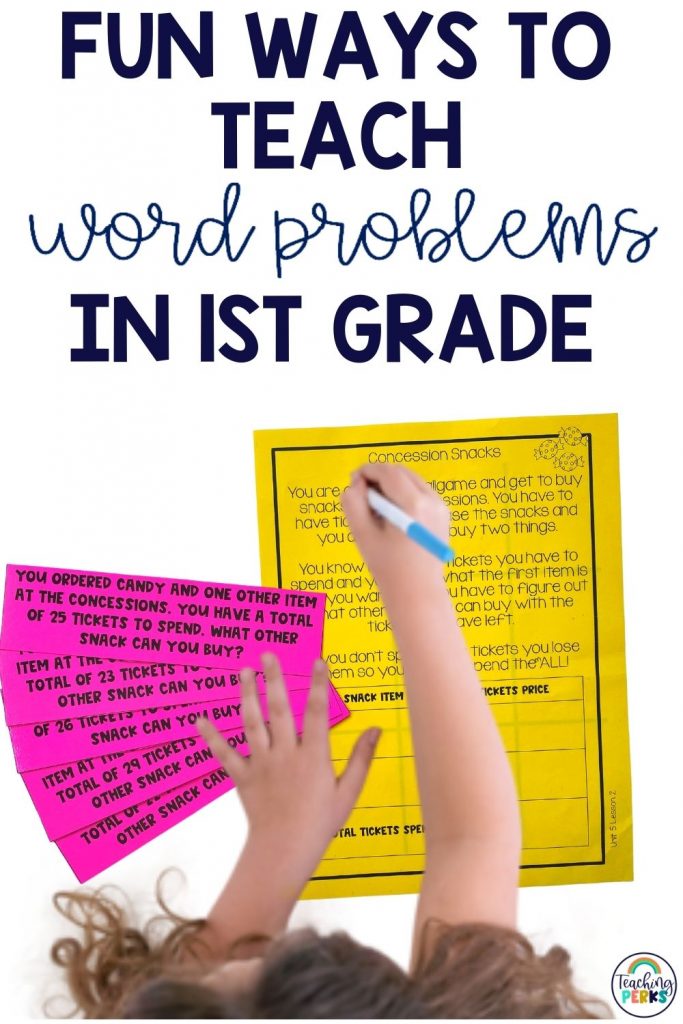I’m sure you have seen the keywords in word problems anchor chart that give students a list of math keywords to look for when solving word problems. You know the ones that say if you see words such as sum, all, or total then you add. Or if you see the words less, difference, or fewer then you subtract. Well this is an outdated strategy that should no longer be taught when teaching word problems. Let me explain why math key words are not the way to go and give you some new and different strategies to try.


Reason #1 To Not Use Keywords in Word Problems
First of all students need to practice critical thinking skills, especially in math. If we tell students to look for these subtraction keywords or addition keywords we are basically teaching them to not think through the problem to figure out what they need to do. It is an easy way for students to skim math word problems and look for specific words that tell them to add or subtract. Looking for word problem keywords will is not a great way to help students and it will definitely cause students to become weaker in math and comprehension.

Reason #2 To Not Use Keywords in Word Problems
Another reason this is not a good strategy is because many times there are not keywords in word problems. So, as mentioned above, students have been taught to skim for a keyword but if there is not one, they are left not knowing what to do because they haven’t been taught the proper way to analyze a math problem. There are many different types of word problems, so students cannot just scan for keywords.

Let me give you some examples.
14 grapes are in the basket. 6 are green and some are purple. How many are purple?
6 dogs are at the park. 4 more dogs come to the park. How many dogs are at the park now?
Both of these examples do not contain keywords that would tell students what to do in order to solve or which math operation they need to use. This would leave a lot of students stumped and frustrated.

Or look at this one. Some kids are at the playground. 4 kids leave and now there are 12 kids. How many kids are on the playground now? Some would argue that the word “leave” would tell us to subtract but in reality “leave” is not a keyword that would be taught so students would still be left not knowing.
If students only know to look for keywords then these types of problems would leave them confused because they don’t contain a keyword.
Reason #3 To Not Use Keywords in Word Problems
Some words in contextual problems can be misleading. Take a look at this problem. There are 4 buses. Each bus has 5 students. How many students are there in all? In all would tell you to add right? Leading students to believe this is an addition word problem. Well if we add we get 9 which is not the correct answer so the keyword strategy fails us there.
One more example. Maggie has 6 more crayons than Jake. Maggie has 10 crayons. How many crayons does Jake have? More would tell us to add, but if we add 10 + 6 we get 16 and that is not the right answer.
If No Keywords for Word Problems Then What?
So you might be wondering what is the right way to teach students to solve word problems to help them in the long run? Make sure to explicitly model how to analyze a problem and have students using manipulatives, drawings, work mats and organizers. Giving students a variety of strategies will help improve their problem solving skills.

Another suggestion would be to have students restate the word problem in their own words. This is one of my favorite strategies and ensures students really comprehend what the word problem is about and what it is asking them to do. It helps them understand the context of the word problem. This is a great strategy to use in small groups as an informal assessment.
My word problem lesson plan bundle is a great resource that will help you with all of this. It includes small group lesson plans that have students doing these exact things so they master solving subtraction word problems and addition word problems in no time. The best part about these lesson plans is they are differentiated to help you spend less time planning you math centers and activities!

If you want to read more about teaching students to solve word problems then make sure to read this blog post where I share fun and engaging ideas to use in your 1st grade classroom.

[…] to read more on word problems 1st graders? Check out this post on why not teach students to look for keywords when solving word problems or this post on fun and […]